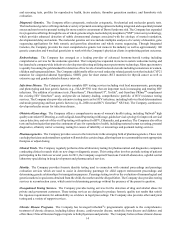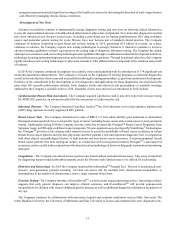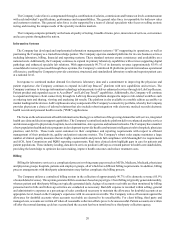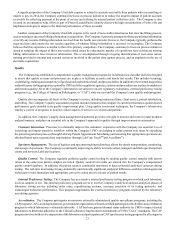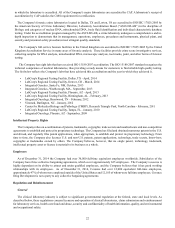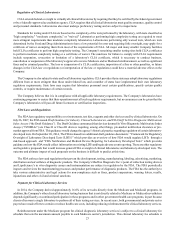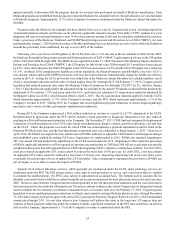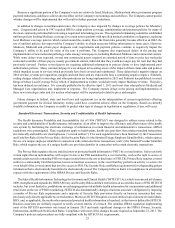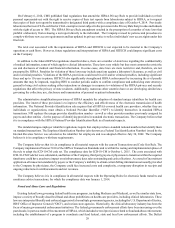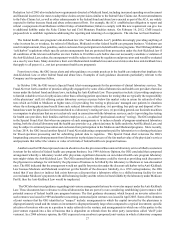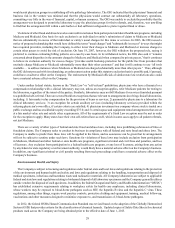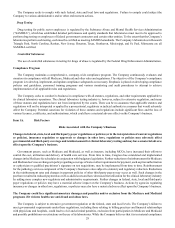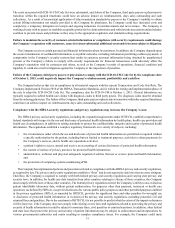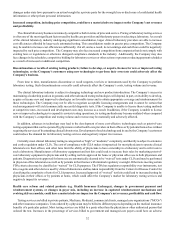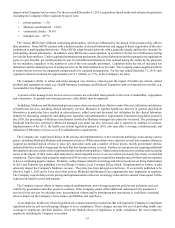LabCorp 2014 Annual Report Download - page 25
Download and view the complete annual report
Please find page 25 of the 2014 LabCorp annual report below. You can navigate through the pages in the report by either clicking on the pages listed below, or by using the keyword search tool below to find specific information within the annual report.23
Regulation of Clinical Laboratories
CLIA extends federal oversight to virtually all clinical laboratories by requiring that they be certified by the federal government
or by a federally-approved accreditation agency. CLIA requires that all clinical laboratories meet quality assurance, quality control
and personnel standards. Laboratories also must undergo proficiency testing and are subject to inspections.
Standards for testing under CLIA are based on the complexity of the tests performed by the laboratory, with tests classified as
"high complexity," "moderate complexity," or "waived." Laboratories performing high complexity testing are required to meet
more stringent requirements than moderate complexity laboratories. Laboratories performing only waived tests, which are tests
determined by the Food and Drug Administration to have a low potential for error and requiring little oversight, may apply for a
certificate of waiver exempting them from most of the requirements of CLIA. All major and many smaller Company facilities
hold CLIA certificates to perform high complexity testing. The Company's remaining smaller testing sites hold CLIA certificates
to perform moderate complexity testing or a certificate of waiver. The sanctions for failure to comply with CLIA requirements
include suspension, revocation or limitation of a laboratory's CLIA certificate, which is necessary to conduct business,
cancellation or suspension of the laboratory's approval to receive Medicare and/or Medicaid reimbursement, as well as significant
fines and/or criminal penalties. The loss or suspension of a CLIA certification, imposition of a fine or other penalties, or future
changes in the CLIA law or regulations (or interpretation of the law or regulations) could have a material adverse effect on the
Company.
The Company is also subject to state and local laboratory regulation. CLIA provides that a state may adopt laboratory regulations
different from or more stringent than those under federal law, and a number of states have implemented their own laboratory
regulatory requirements. State laws may require that laboratory personnel meet certain qualifications, specify certain quality
controls, or require maintenance of certain records.
The Company believes that it is in compliance with all applicable laboratory requirements. The Company's laboratories have
continuing programs to ensure that their operations meet all such regulatory requirements, but no assurances can be given that the
Company's laboratories will pass all future licensure or certification inspections.
FDA Laws and Regulations
The FDA has regulatory responsibility over instruments, test kits, reagents and other devices used by clinical laboratories. On
July 26, 2007, the FDA issued Draft Guidance for Industry, Clinical Laboratories, and FDA Staff: In Vitro Diagnostic Multivariate
Index Assays (“the Draft Guidance”). The Draft Guidance announced that devices deemed In Vitro Diagnostic Multivariate Index
Assays (“IVDMIAs”) are Class II or Class III devices requiring, among other things, pre-market notification clearance or pre-
market approval from FDA. This guidance would change the agency’s historical practice regarding regulation of certain laboratory-
developed tests. On September 20, 2014, The FDA released two additional draft guidance documents: “Framework for Regulatory
Oversight of Laboratory Developed Tests ('LDTs')” which provides an overview of how FDA would regulate LDTs through a
risk-based approach and “FDA Notification and Medical Device Reporting for Laboratory Developed Tests” which provides
guidance on how the FDA would collect information on existing LDTs and begin adverse event reporting. There are other regulatory
and legislative proposals that would increase general FDA oversight of clinical laboratories and laboratory-developed tests. The
outcome and ultimate impact of such proposals on the business is difficult to predict at this time.
The FDA enforces laws and regulations that govern the development, testing, manufacturing, labeling, advertising, marketing,
distribution and surveillance of diagnostic products. The Company’s MedTox Diagnostic Inc.’s point of collection testing devices
and LipoScience’s in vitro diagnostic assays and instrumentation are subject to regulation by the FDA. The FDA periodically
inspects and reviews the manufacturing processes and product performance of diagnostic products. The FDA has the authority to
take various administrative and legal actions for non-compliance such as fines, product suspensions, warning letters, recalls,
injunctions and other civil and criminal sanctions.
Payment for Clinical Laboratory Services
In 2014, the Company derived approximately 16.0% of its net sales directly from the Medicare and Medicaid programs. In
addition, the Company's other clinical laboratory testing business that is not directly related to Medicare or Medicaid nevertheless
depends significantly on continued participation in these programs and in other government health care programs, in part because
clients often want a single laboratory to perform all of their testing services. In recent years, both governmental and private sector
payers have made efforts to contain or reduce health care costs, including reducing reimbursement for clinical laboratory services.
Reimbursement under the Medicare program for clinical diagnostic laboratory services is subject to a clinical laboratory fee
schedule that sets the maximum amount payable in each Medicare carrier's jurisdiction. This clinical laboratory fee schedule is



